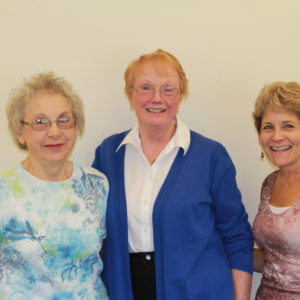 After 18 years the Nodaway County Crusade Against Cancer (NCCAC) has disbanded, but members believe their accomplishments will carry on.
After 18 years the Nodaway County Crusade Against Cancer (NCCAC) has disbanded, but members believe their accomplishments will carry on.
The volunteer community-based cancer coalition formed in 1998. The group made colorectal cancer awareness their main cause because, as Sue Gille, chairperson, said, no one talked about it and doctors didn’t encourage patients to have colonoscopies or take the fecal occult blood test (FOBT).
NCCAC was created with a Center for Disease Control (CDC) grant. The CDC has since used the NCCAC as an example of how a community volunteer group can make a difference in the fight against cancer.
The organization has made a difference. The rate of colorectal cancer has dropped in Nodaway County, and in 2010, the county was under the state average for that cancer.
NCCAC members used data to guide their work. Judy Frueh, Northwest Wellness Services, collected data from SSM Health St. Francis Hospital, Maryville, and Community Hospital, Fairfax, starting in 1999. The group used the data to determine what steps and strategies to take.
Gille said the NCCAC had the data to back up its decisions. After examining the data, the group brought in guest speakers and began physician education.
Gille said she believes the committee made a difference by educating the community about exercise, diet and screenings. She said the significant drop in cancer is a result of changes in behavior, public education and community support.
Gille, Frueh and Della Rhoades all credit SSM Health St. Francis Hospital for its tremendous support, including processing free FOBT. These tests have improved over the years. They are easier for patients to use and have fewer false positives.
Teri Harr, SSM Health St. Francis Hospital patient education, helped the NCCAC by creating no-smoking campaigns. These resulted in Maryville City ordinances in 2003, which made restaurants smoke free, and in 2008, which made businesses smoke free. Because of Harr’s work, Maryville was a leader in the state on these issues, Gille said.
Besides colorectal and lung cancer, NCCAC supplied education on breast and skin cancer.
Frueh said that for a small group, NCCAC accomplished a lot and saturation was key. Members submitted information to newspapers, health fairs, flu clinics and the senior center. Members spoke to churches, schools and organizations about the importance of screenings.
Watkins kept track of expenses, income and writing grants.
The final NCCAC contribution was mailing postcards to women ages 35 to 65 about the new 3D mammogram at SSM Health St. Francis Hospital.
Miller said the mailing made an impact. The mammography department has had an increase in scheduled mammograms and women say they received the reminder.
NCCAC members said people should consult their healthcare provider about the variety of screenings available. Individuals also need to understand the continued importance of healthy choices in food and exercise.
Gille said she is impressed with the My Chart service at SSM Health St. Francis Hospital. It allows patients to view their charts online and shows if they are overdue for tests or screenings. The digital charts allow doctors to efficiently scan patient paperwork.
The community is more health conscious now than when the group started, Gille said.




Facebook Comments